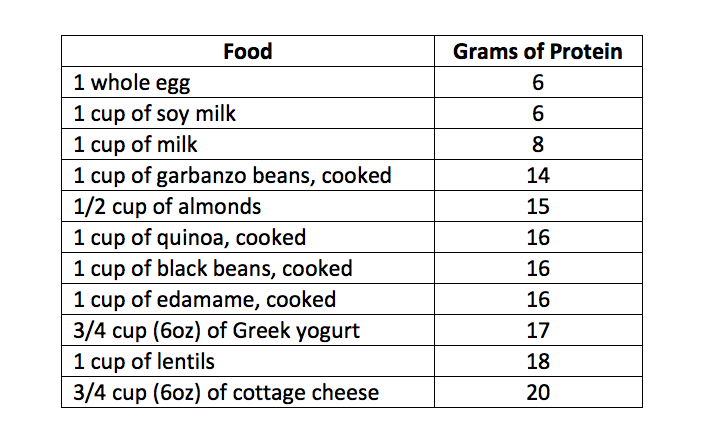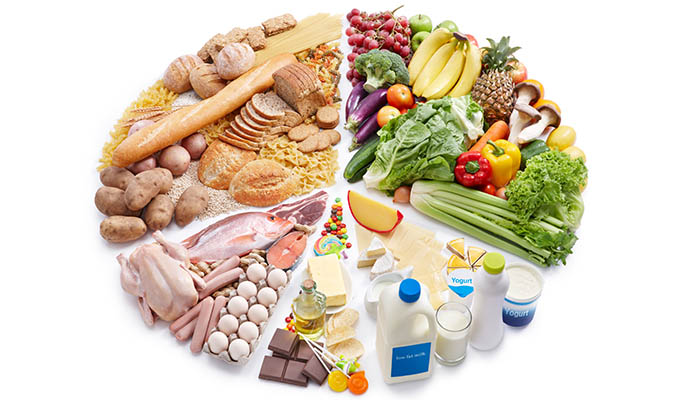Over the weekend, on a run with a friend in Seattle, we got on the topic of protein intake. It was interesting just how much we differed in our consumption. Currently training for the marathon, and as a consistent runner year-round, she includes protein in almost all meals and disclosed that she craves protein in general. I, on the other hand, don’t track my protein intake, and only make an effort in “protein consciousness” post workouts, with shakes that include protein powder. I am also a consistent runner and currently trying to run marathon #2 within 8 wks of the last. I don’t believe I’m deficient in intake, but I do believe it could be better, and that said friend is a good example of proper consciousness. So I did some research:
– “According to the World Health Organization, humans need to get only 10 percent of their daily calories from protein to maintain health. There is reason to believe that runners may need more, however, because running breaks down muscle proteins and damages muscle fibers, and protein is needed for the muscles to recover from the daily onslaught of training. But a study of the diet of elite Kenyan runners found that they got only 10 percent of their daily calories from protein. Given their running performance, it would be difficult to argue that this wasn’t enough. Such numbers are deceptive, though. It is more helpful to think of protein needs in terms of amounts of protein relative to body weight instead of protein as a percentage of daily calories. That’s because running increases total energy—carbohydrate, fat, and protein—needs. So you may get 10 percent of your daily calories as a non-runner and then continue to get 10 percent of your daily calories as a runner, but you’re eating more protein as a runner, because you’re eating more total calories. So, how much protein do you need as an amount relative to your body weight? If you train lightly, 0.5 gram per pound of body weight should do; 0.8 gram per pound of body weight may be needed if you run a lot of miles…There is also some evidence that very high protein intakes help endurance athletes absorb heavy training loads. For example, a study at the University of Birmingham, England, found that cycling time trial performance was reduced less after a period of intensified training when cyclists increased their protein intake to 1.36 grams per pound of body weight at the start of that heavy training block instead of leaving it at 0.68 g/lb.”

– “The amount of protein a person needs when they are not training is .8 grams (g) per kilogram (kg) of body weight. Protein requirements increase when you are doing endurance or resistance training. For optimal recovery during endurance training, 1.2 to 1.7 g of protein per kg of body weight is required. For muscle recovery during endurance training, 1.2 to 1.7 g of protein per kg of body weight is optimal. If you fail to consume enough protein when training hard, your body will break down muscle to fuel your body on training runs. The goal with running is to build and maintain lean muscle mass, not break it down for fuel. To help you along, you can use these formulas to determine how much protein you personally need:
Converting Pounds (lbs) to kg
Divide your current weight in pounds by 2.2
Example: 160 pound male is (160/2.2=) 72.7 kg
Determining amount of protein you need
Weight in kg multiplied by recommended protein intake.
Example: (72.7kg X 1.4 g of protein) = 102 g of protein per day required for a 72.7 (160lb) runner.”
– “How To Use the Protein Range for Your Specific Training”
1.) If you are training for a 10k – 1/2 marathon
“I would suggest starting at 1.2 g of protein per kg of body weight. If you feel great and recovery is happening quickly, then this is the perfect amount for you. If you are not recovering well, you may need additional protein while you are training, so increase your protein uptake to 1.5g per kg of bodyweight. You can also fluctuate your protein intake based on the intensity of your training day. For example, on hard workout days,you can increase your protein intake to 1.5g while on easy recovery days or rest days, you can bring your protein intake to 1.2g. Keep experimenting with slight increases in your protein intake until you notice a positive difference in your recovery rate.”
2.) If you are training for a marathon
“I would suggest starting at 1.4 g of protein per kg body weight and apply the same process as the 10k-1/2 marathon group. Give yourself about a week at each protein level to determine if it is the right amount for you. Now that you know how much protein you need, don’t feel like you have to watch every gram you consume. As long as you stay within a range of about +/- 10g of protein from the suggested amount for your body weight, your recovery will be fine.”
– “Since protein helps muscles heal faster, runners who consume the right amount are less likely to get injured. The reverse is also true…Athletes who get insufficient amounts of protein are at a higher risk of injury. What’s more, high-protein intake has been shown to help maintain a strong immune system. ‘After an intense bout of exercise, your immune system is weakened for about four to five hours,’ says Richard Kreider, Ph.D., one of the ISSN study’s authors and head of the Exercise and Nutrition Laboratory at Baylor University. ‘Protein stimulates white blood cells, which helps shield against upper-respiratory problems.’”
– “Lean meats and other animal products, like eggs, milk, and whey (a by-product of milk), pack a lot of protein. Four ounces of chicken breast, for example, contain about 32 grams of protein. The fat in food interferes with the rate of protein absorption, so limit your intake of high-fat foods, such as rib eye or prime rib. Vegetable-based sources, such as beans, lentils, nuts, seeds, and soy, aren’t as protein-dense–a half cup of black beans, for example, has about eight grams–and they fall short on all nine essential amino acids, the chemical building blocks of protein (the exception is soy). Runners who avoid animal products can make up for this deficit by eating a variety of the most protein-rich vegetables and grains, such as soybeans, oats, and quinoa. ‘Not all the protein in a food is easily absorbed by your body, but you’ll probably get enough as long as you eat a lot of different kinds of food.’”
– In the Runner’s World Eat More Protein article, “A Powerful Day” is highlighted in:
A 165-pound runner needs between 75 and 120 grams of protein daily. Spread intake throughout the day, eating some at each meal, to ensure your body has a steady supply.
7 a.m.
3/4 cup oatmeal + two scrambled eggs + six ounces orange juice + cup of coffee with skim milk = 25 grams
10 a.m.
Banana + two tablespoons peanut butter = 8 grams
11 a.m. (prerun)
Half a bottle of protein sports drink (about four grams of protein per serving) + 12 p.m. (postrun)Second half of the sports drink = 8 grams
1 p.m.
Two slices whole-wheat bread, four ounces sliced turkey, one ounce sliced reduced-fat cheese, lettuce, tomato, mustard + six ounces fat-free yogurt = 40 grams
6 p.m.
Mixed-greens salad with peppers, cucumber, and tomato; one tablespoon balsamic vinaigrette dressing + four ounces grilled salmon + 1 1/2 cups steamed broccoli and cauliflower + one medium baked sweet potato = 33 grams
Protein Total=114 grams
Sources: Protein Intake & Performance For Runners, Eat More Protein, Protein for Runners,

